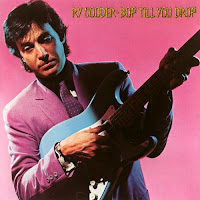 CDs weren’t the first digital recordings. The first pop record recorded with digital equipment was Ry Cooder’s “Bop Till You Drop,” which was pressed on vinyl in the LP format. It was a revelation, though. On pristine vinyl, you could hear that there was no analog tape hiss on the master studio recording.
CDs weren’t the first digital recordings. The first pop record recorded with digital equipment was Ry Cooder’s “Bop Till You Drop,” which was pressed on vinyl in the LP format. It was a revelation, though. On pristine vinyl, you could hear that there was no analog tape hiss on the master studio recording. Little did we know at the time that digital technology was signing the death warrant for places like Circles. I came out from the East Coast used to mom-and-pop record stores with names like Harmony House and Stereo City. I was a record nerd, no question, and would spend hours combing through the bins and talking with the salespeople, who usually were record nerds themselves. Finding a dusty pressing of Johnny Cash stuffed away in the bargain bin or combing through the jazz miscellany bin to find one of Sun Ra’s ESPdisc LPs would give me a kick.
Little did we know at the time that digital technology was signing the death warrant for places like Circles. I came out from the East Coast used to mom-and-pop record stores with names like Harmony House and Stereo City. I was a record nerd, no question, and would spend hours combing through the bins and talking with the salespeople, who usually were record nerds themselves. Finding a dusty pressing of Johnny Cash stuffed away in the bargain bin or combing through the jazz miscellany bin to find one of Sun Ra’s ESPdisc LPs would give me a kick.That’s why I was glad to find Circles soon after I came to work in the desert metropolis. The store’s selection of 45 RPM singles was awe-inspiringly complete for somebody looking for oldies he didn’t have the spare change to buy two decades earlier.
I remember being lonesome for some Italian sounds — being 3,000 miles from my father’s record collection. So I went to Circles. Lo and behold, in the international bin they had just what I wanted, “My Naples,” a 1964 album by Sergio Bruni that my father played to death (and I played to death when he was out of the house).
I can’t tell you how many records I bought at Circles or how much time I spent there.
When I didn’t have a job downtown anymore, Circles was out of the way unfortunately, and I haven’t been there in a while. Now, it’s just about too late. The store will close for good Saturday (March 20, 2010), a victim of a changing industry.
 Just as the Ry Cooder album with digital recording on vinyl represented an intermediary step to full digital reproduction on CD, the CD represented an intermediary step in record distribution. Pretty much the same record distribution network that served vinyl and cassette recordings was used to distribute CDs. The underlying business model didn’t really need to change. The music buyer was buying an object in order to get the performance recorded on that object.
Just as the Ry Cooder album with digital recording on vinyl represented an intermediary step to full digital reproduction on CD, the CD represented an intermediary step in record distribution. Pretty much the same record distribution network that served vinyl and cassette recordings was used to distribute CDs. The underlying business model didn’t really need to change. The music buyer was buying an object in order to get the performance recorded on that object. CDs weren’t subject to some of the wear and tear issues that made record collectors handle their vinyl with the care you’d lavish on a newborn, so they quickly killed off vinyl LPs. Oh yeah, guys like Eddie Vedder of Pearl Jam would champion vinyl, but that couldn’t stay the tide of CDs.
Well, digital recording ultimately paved the way for a different business model: a distribution system that doesn’t rely on selling objects that contain the recording. Instead, digital files can be distributed effortlessly via the Web to computers, mp3 players, smart phones and laptops and who knows what else in the future.
That’s made the record store something like a vinyl record in the mid-1980s, a quickly dying breed. Big chains like Tower Records - who drew many buyers away from mom-and-pop shops like Circles – are long gone already. Even big-box retailers like Walmart, which virtually controlled the CD distribution chain through the 1990s, are diminished powers in the distribution of recordings. The big power is Apple, and we’re not talking The Beatles’ record label, but the computer company’s online iTunes store.
My enjoyment of dusty record bins and hidden treasures doesn’t translate to a generation weaned on Google searches that bring them right to the mp3 file they’re seeking.
So it’s amazing that Circles has lasted this long. I’ll take that Sergio Bruni record out for a few spins this weekend in honor of Circles bowing to the inexorable trend of history. Oddly enough, I can’t find that album on iTunes.
Copyright © 2010, Salvatore
Caputo